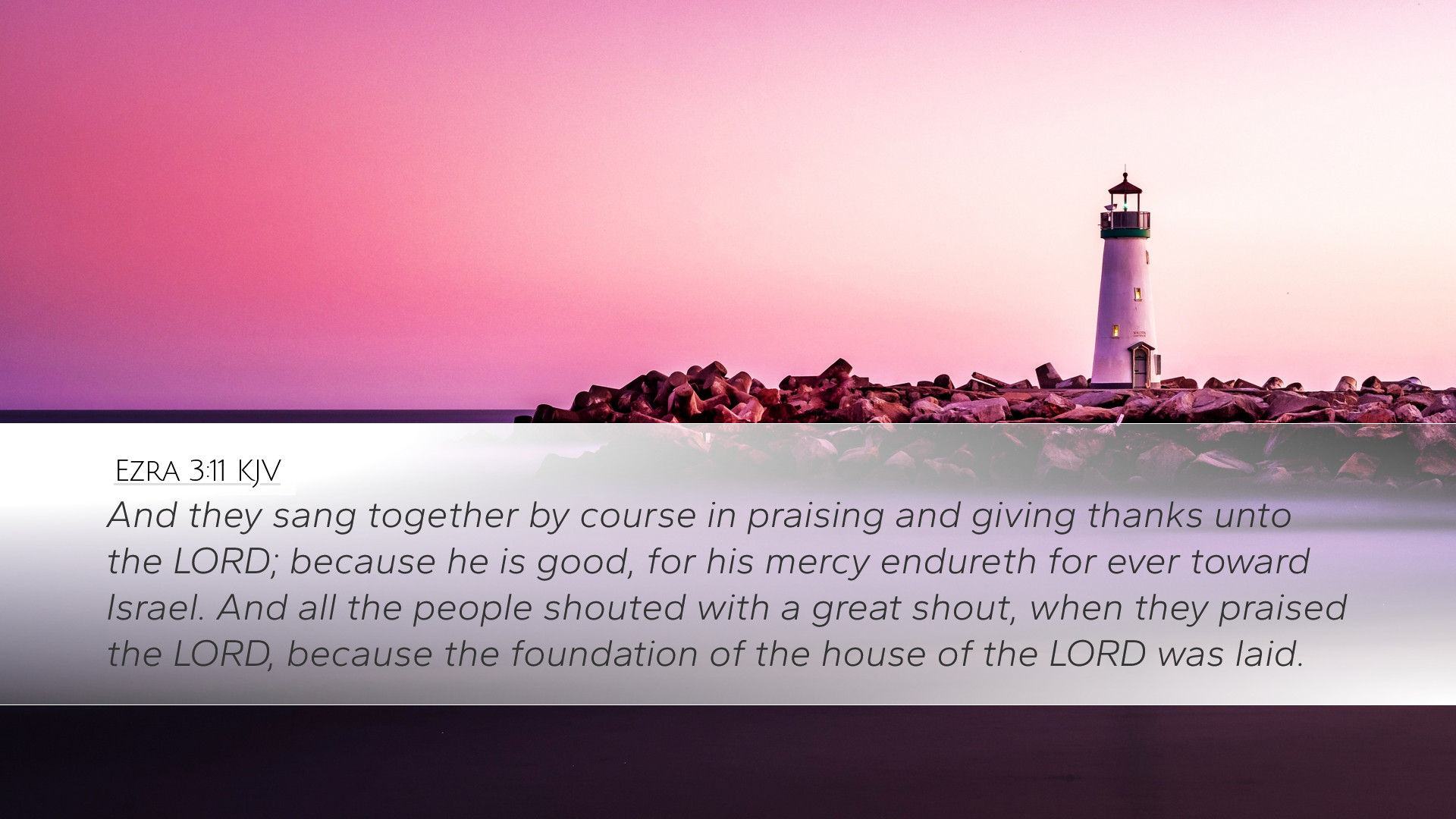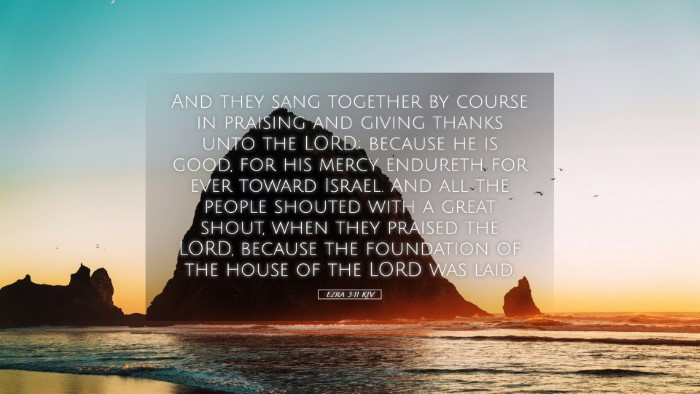Old Testament
Genesis Exodus Leviticus Numbers Deuteronomy Joshua Judges Ruth 1 Samuel 2 Samuel 1 Kings 2 Kings 1 Chronicles 2 Chronicles Ezra Nehemiah Esther Job Psalms Proverbs Ecclesiastes Song of Solomon Isaiah Jeremiah Lamentations Ezekiel Daniel Hosea Joel Amos Obadiah Jonah Micah Nahum Habakkuk Zephaniah Haggai Zechariah MalachiEzra 3:11
Ezra 3:11 KJV
And they sang together by course in praising and giving thanks unto the LORD; because he is good, for his mercy endureth for ever toward Israel. And all the people shouted with a great shout, when they praised the LORD, because the foundation of the house of the LORD was laid.
Ezra 3:11 Bible Commentary
Commentary on Ezra 3:11
Ezra 3:11 states:
"And they sang together by course in praising and giving thanks unto the Lord; because he is good, for his mercy endureth forever toward Israel. And all the people shouted with a great shout, when they praised the Lord, because the foundation of the house of the Lord was laid."
Introduction
In this verse, we observe a moment of profound significance in the life of the returning exiles. The religious and societal restoration of Israel is at hand as they begin to rebuild the Temple. This verse captures the spiritual rejoicing and communal experience of the people, highlighting themes of gratitude, divine goodness, and the enduring mercy of God.
Main Themes
- Corporate Worship: The text underscores the importance of communal praise, reflecting a unified community in worship.
- The Goodness of God: Emphasizes God's inherent goodness, reminding readers of His character in the midst of their circumstances.
- Enduring Mercy: The reference to God's mercy encapsulates the covenant relationship between God and Israel, pointing towards His faithfulness throughout generations.
- The Significance of the Temple's Foundation: The laying of the foundation symbolizes hope and restoration for Israel's worship and identity.
Verse Analysis
The phrase "And they sang together by course" illustrates a structured approach to their worship, with organized participation that reflects both order and unity. Such singing not only serves as an expression of joy but also affirms their collective identity and purpose as God's people.
Matthew Henry notes that singing during worship signifies an acknowledgment of God’s sovereignty and power. The emphasis on corporate singing serves as a critical reminder of the community aspect of faith—believers coming together to worship and express gratitude.
The Goodness of the Lord
The declaration "because he is good" signifies an understanding of God's character. Albert Barnes mentions that God's goodness is not merely a trait but an active expression in the lives of believers, particularly in the restoration and providence shown to the Israelites. This understanding of God's goodness serves as a foundation for their praise and results in a communal outpouring of gratitude.
Mercy Towards Israel
The phrase "for his mercy endureth forever toward Israel" reflects a deep theological insight into God's nature. Adam Clarke elaborates that this enduring mercy is not conditional but is a part of God's covenant relationship. It reassures the people of God’s faithfulness even when they face challenges. This enduring mercy is a source of hope for those who feel unworthy or abandoned; it reminds the community that God’s love remains steadfast despite their past disobedience.
Application for Today
This verse carries significant implications for contemporary worship practices. The corporate expression of praise outlines a theological framework that transcends generations. Today, churches are encouraged to incorporate structured worship and collective gratitude, fostering a spirit of community that reflects the unity found in the early returning exiles.
The celebration of God’s goodness and mercy invites believers to reflect upon their experiences of grace. Just as the Israelites rejoiced over the foundation of the Temple, modern believers are called to celebrate their spiritual foundation in Christ. The enduring mercy of God remains a central tenet of the Christian faith, offering assurance of His ongoing presence in their lives.
Conclusion
Ezra 3:11 serves as a poignant reminder of the importance of remembering God's faithfulness, celebrating His goodness, and actively engaging in communal worship. As pastors, students, theologians, and scholars ponder this verse, they are urged to draw connections between the historical context of the Israelites and the contemporary church experience. Let this verse inspire a revitalization of worship practices that honor both the individuality and unity of the body of Christ.


